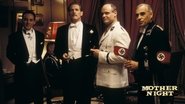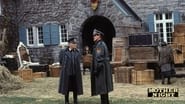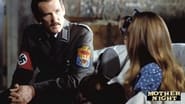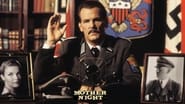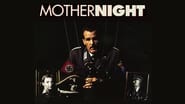VeteranLight
I don't have all the words right now but this film is a work of art.
Intcatinfo
A Masterpiece!
Taraparain
Tells a fascinating and unsettling true story, and does so well, without pretending to have all the answers.
dimtrav-1
Having recently reviewed the DVD with Nolte's comments I must add a little explanation for the other reviewers who never got the motivation behind Campbell choosing to follow through with the spying.Campbell is a romantic through and through, he sees the action of spying in all its media created romance and not in the hard bitten truth that exists in real life. His relationship with Helga is just one more aspect of this romantic attitude and Helga is not at the center of his universe for long. Too many humans still consider war a romantic ideal filled with "action" and "heroes." Humans forever tell themselves that they are full of good intentions, that we mean well and so does Campbell. He never truly understands how his part in the war (the little devices created for him that somehow offer information to the allies) fits in but most of all he fills a role, a role of a lifetime on a huge international stage he is by career a actor/playwright and there is simply no bigger role he could take. Again fulfilling a "romantic ideal." But by playing the role as anti-Semitic propagandist he becomes so close to that role that he cant even separate himself from it, he becomes the role. Another "romantic ideal." But his being manipulated because of this romantic leanings leaves him empty inside and longs for real life. The contact "with the secret" John Goodman's role as the blue fairy godmother does appear and save him from himself a couple of times, but ultimately cannot in the end save him.This is an excellent cast and Vonnegut's novel is entirely intact and he does have a walk on non-speaking appearance toward the end. But this film is for the thinking audience not the shallow end of the mental pool.
TBJCSKCNRRQTreviews
I have not read the novel, or anything other by Kurt Vonnegut, but I am now intending to start. This grips you from the very first frame, and does not let go until the end credits start rolling. Taking you places you don't expect, the plot is interesting throughout. The pacing is spot-on, nothing lasts too long, and this does a perfect job of balancing between unexpected twists and allowing the viewer to process what we've seen. It is well-told and well-thought out. I've never watched a film that I feel I could particularly compare this to. It is intense and exciting, as well as funny and sad. The acting is excellent, Nolte absolutely shines, Goodman again proves that he doesn't have to go for laughs, and Lee and Arkin are spellbinding. I could go on, really... no role is treated to a less than stellar performance. The editing and cinematography are marvelous, and all of the visuals are great, with a couple of unforgettable and astonishing ones. I am going to go for other movies directed by Keith Gordon, as well as the other two apparently related to this, through the author of the books. There is one scene of sexuality, and a lot disturbing and unsettling content in this. I recommend this to anyone who can appreciate it; it is not pleasant. 8/10
Robert J. Maxwell
It takes a little while to get used to Nick Nolte's Nebraskan locutions before we can easily accept him as a famous intercontinental playwright. Once you get past the bar, it turns into a fascinating story of a man who loses everything while trying to do good.Nolte, an American, moves to Germany, marries a famous actress, and is a satisfied success in every respect until war is about to break out. He's visited by a jovial American, John Goodman, who persuades him to accept a post as an anti-Semitic radio broadcaster for the Nazis. Nolte has no politics but thinks it's a challenge to write a role that's almost impossible and then play it himself. Another American secret agent will modify Nolte's radio scripts -- inserting a cough here, a sneeze there -- that will serve as a code for the transmission of intelligence to the Allies. There's a catch, though. Nobody will know about Nolte's real role as an American agent except Goodman, Donovan, and Roosevelt himself. If he's ever uncovered, he'll be refused recognition by the Americans.Nolte plunges ahead and his vicious broadcasts are wildly popular in Germany. His adored wife, Sheryl Lee, knows nothing of what's going on, nor does she care. Nolte and Lee live in what he repeatedly refers to as "a nation of two." The war ends and the trouble begins. He's captured by Americans who are bitter because of his betrayal. They beat him and leave him in the mud. He's rescued by Goodman, his "fairy godmother", who sends him to an anonymous existence in Greenwich Village and sends him a little cash now and then.By 1960, he manages to cultivate a friendship with his neighbor, the painter Alan Arkin, who has also lost his family and claims the two now belong to a secret brotherhood. But his location and his identity somehow leak out and he is more or less adopted by a group of ancient Aryan racists -- led by a dentist and a priest. His house front and mailbox are painted with swastikas and accusations. He's beaten senseless by an ex-GI. But -- miraculously -- his beloved wife is returned to him by the ancient Aryans. Another catch: it turns out later that it's not his wife, but rather her younger sister who has loved him since adolescence.The ending has him typing his memoirs in an Israeli jail in 1967 before his trial for crimes against humanity. It's not a happy ending.Nolte can talk with, but not see, the occupant of the cell above his in jail. It's Adolf Eichmann. Eichmann seems pleasant enough. He advises Nolte that it's a bad habit to type for fifteen straight hours. "It's important to relax. You must learn to relax." Nolte laughs out loud and shouts, "That's how I GOT here." The film is filled with such ironies. At one point in their relaxed conversations, Arkin tells him that "in spite of everything I still think people are good at heart." I don't know if the movie was a commercial success but if it wasn't, that's the sort of thing that might have torpedoed it for a younger audience of theater-goers who may never have heard of Anne Frank let alone that supposedly final statement in her diary.The fact is that it's a movie for adults, and patient adults at that. The story moves slowly, there's very little violence, no car chases, no shootings, and people don't seem subject to manic speech pressure. A lot of it will probably slip past viewers who don't open themselves to its deliberate approach. Nolte refers to the war-time relationship between him and his wife as "a nation of two." This is a pretty compact phrase. No doubt anyone could come up with a glib definition but it takes a little concentration to grasp its emotional import.It's a story of a man who loses everything -- his ability to write, his identity, his wife (twice), his sole friend, his country, his self respect. At one point he stops walking along a crowded New York street and simply stands there until after dark, when he is moved along by a curious cop. The reason he stopped is that he simply has no place to go. What Vonnegut is describing is far more than depression. I don't mean to sound condescending but it's the sort of feeling that's hard to understand in your youth. Adolescents might like to THINK they know what's holding Nolte in that one spot, but it really requires maturity and the quickened sense of finiteness that only maturity can bring.Remember Robert Frost's line about home being the place that when you go there they have to take you in? Well no place will take Nolte in.
karhukissa
Although I like Kurt Vonnegut, I'm not particularly interested in spy stories and I didn't know this one. The only reason I watched it was Nick Nolte, who is one of my favorite actors since I saw "Breakfast of Champions" and "Hotel Rwanda". But the film brought me a pleasant surprise. Of course Nolte was great, but so was the plot. There was relatively little political intrigue, and much more focus on the moral question: by reading his anti-Semitic radio commentaries with hidden secret messages to Americans, he in fact contributed to the general attitude of Germans (and, as it later turns out, Americans) towards Jews or Hitler. Which carries more weight, his service to his country or his unconscious contribution to anti-semitism? The dilemma is even more prominent as these words are never spoken, not even as narration. Howard Campbell Jr. (Nolte) is a person who learnt to hide his feelings so perfectly that he doesn't open up, not even in his memoirs. The inner conflict of such a character is almost impossible to portray - but with the help of excellent acting and photography, this film manages. There are other points to it, such as the humor or the ironical use of romantic clichés (like the song White Christmas), that make it real different from average American movies. I recommend it to everyone who is bored with Hollywood spy movies.

